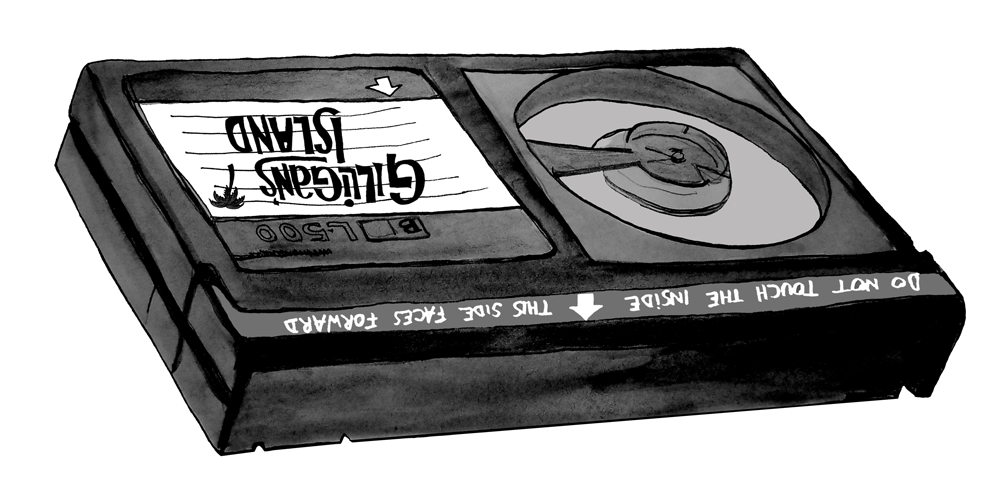VHS v. Beta
by Tatiana Ryckman
illustration by Emmanuelle Ly
30 years ago, the Supreme Court ruled in favor of Sony’s Betamax, deciding that it was legal to record television programs from the comfort of one’s living room couch.
But let’s fast-forward to a mere 25 years ago: An episode of Gilligan’s Island—the episode where the Professor builds a radio, or maybe the one where the island natives are lurking behind palm trees—is playing in the basement. The episodes are interrupted by the ongoing updates of fund drive success for the local Cleveland PBS station and commercials for stuffed animals, whose noses would fill with whirling plastic beads when depressed, or those plush dogs that littered puppies on demand. All you had to do was pull the pups from the mother’s gut and stuff them back in (just like real life) when you wanted to settle down to recreate scenes from The Miracle of Life—another film my family owned on Beta.
I say “another film” because I watched those two episodes of Gilligan’s Island for years before realizing they were reruns, before I understood the concept of reruns, or that these shows were probably reruns before they were even recorded to the small Betamax tape that I’d been watching them on throughout my childhood.
Oddly, it was noticing the toys were always the same that tipped me off rather than the endless fund drive, and still I have this nagging feeling that the same cast of call center employees—ready to thank you for your support while the little red stripe of a cardboard thermometer stays perfectly still for a few decades—must still be rolling somewhere today…
And it turns out—in addition to being dense to the reality that these shows were prerecorded by my parents, that one did not, in fact, need to put in a videotape to watch TV—I was also not very cool. I was left out of the borrowing and lending of FernGully that defined my classmates’ childhoods, and all because their parents had sided with VHS. Decades of classic or campy films were lost to me because of this. And despite, or because of the scientifically proven superiority of Beta, according to my parents, I could not loan a single one of the 15 tapes they had purchased when the video stores started unloading their stock of the failed technology.
Yet, I’m bitterly nostalgic for this total lack of street cred because it feels like the ticket of authenticity I’ve spent the rest of my life looking for as our culture becomes increasingly homogenized. But it’s hard to find one’s identity in the same obscure bands everyone else wants to discover first.
So I find that I’m continually more and more okay with the fact that “sort of dumb” is just another small piece of who I was when I was alone in a teal bodysuit and side ponytail, long after side ponytails were fashionable. It’s this part of my self, all mixed up with VHS v. Beta and lurking behind each new pop culture reference I pile on to the repeated tape of my memory, the record of all the shit I will eventually miss, that makes the base off of which the books I read and the jokes I try to make spring. It’s what I think childhood looks like and why kids with smartphones break my heart. I wonder what the world will look like when no one is allowed to not know something. Will all future generations miss out on the acid trip-esque experience of suddenly realizing everything they believed to be true has always been something else entirely? Isn’t that what growing up is?
It’s as if all those years of thinking the same episode was new made it impossible to learn not to fear for Gilligan; refusing to recognize the familiar set-up trained me to believe that each time he might not make it. I have this deep and sickening nervousness every time we face a different version of VHS v. Beta, like Blu-ray and HD, because one side always has to lose—and what’s more, with each great advance of technology we’re losing something we can’t or wont recognize except by the shape of its absence. It’s as if all those years of worrying for Gilligan trained me to fear for me. That this time things might not turn out okay. But maybe that’s all nostalgia is: Clinging to the things that defined us before the disillusionment of the future. ◥
Tatiana Ryckman was born in Cleveland, Ohio. She has an MFA in Creative Writing from Vermont College of Fine Arts and writes from Austin, Texas. Tatiana is the Managing Editor of The Austin Review and her work has been published with Tin House, Keyhole Press, The Doctor T.J. Eckleburg Review, and Music & Literature. Tatiana leads Creative Writing workshops through The University of Texas at Austin and the Austin Public Library.
Emmanuelle Ly is a french visual artist based in Lyon. She is a tumblr addict. Currently she posts a sketch a day on her blog mixing portraits, iconography, typography, and animated gifs in black and white.








